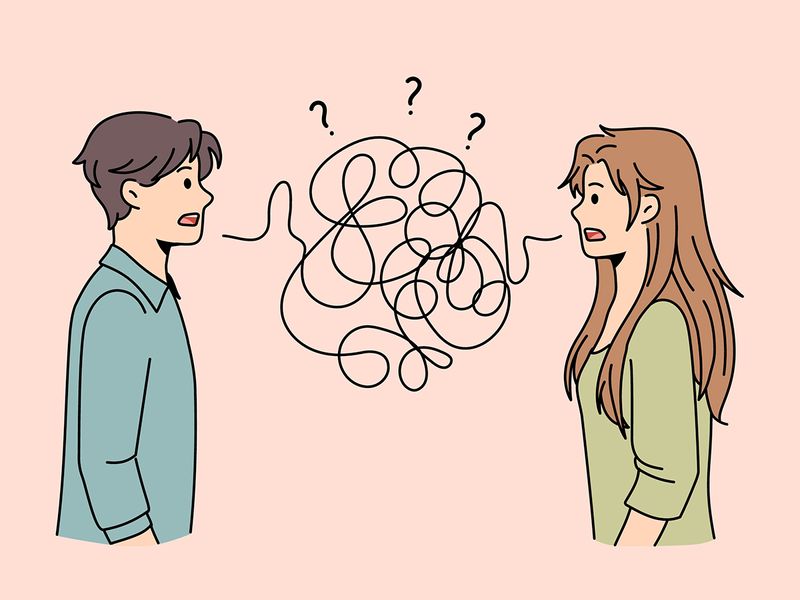
Silences, odd formalities replacing affectionate conversations, strained smiles, and distracted ‘hmms’ during a conversation. Or perhaps, just an overall sense of loneliness in what was once, a rather comforting and loving relationship. When the safe space starts feeling alien, that’s when you know that your loved one is slipping away from you.
You don’t know anything about their life anymore, even if they’re living with you, as Abu Dhabi-based Dipankar Sen (name changed on request) explains from experience. He started becoming a little unsettled when one of his former partners started speaking to him a little ‘differently’. “She wasn’t formal, or anything, but I think that when you know someone so well, there are some things that just the two of you know. She was rather restrained; the smiles seemed a little stiff,” he recalls. When he tried asking if she was all right, she said that all was well, he was overthinking. His friends said the same. Yet, he knew: The ‘good morning’ greetings felt cursory; there were silences at the breakfast table, and gradually there were no messages during the day. “I didn’t know anything what was happening in her life, anymore. She stopped telling me about the little things that she used to tell me about colleagues, office spats and politics and boring meetings.”
Finally, the silences reached a crescendo, with both sides initially hesitating to address the rift. “Finally, one day, she just quietly told me that we were incompatible; she didn’t feel the way she used to. She had moved on, without even her knowing it,” he says.
A pervasive sense of annoyance
While silence becomes the grammar of many fading relationships, Kristy Ann, a Dubai-based American freelancer saw the warning signs in forgetting important dates, things that were personal to both, and finally an inexplicable irritability over small and insignificant things. “It sounds absurd, but he started forgetting little important things that had made the relationship so special in the first place, for example what I liked to eat, what I didn’t like, or certain memories that held a lot of significance for us,” she recalls. “And then, he was just getting irritated by everything that I did; it all just was leading to fights, and arguments, till we finally called it off,” she says.
Why do people slip away from each other?
Relationships can be messy and unpredictable, explain Sheela Iyer, a Dubai-based psychologist. “There’s never really a textbook answer on why people start slipping away from each other. It could be a gradual realisation of incompatibility, or a very heated argument when one party says something unforgivable to the other, or painful life circumstances, like grief, loss, and death, that push people apart,” she says. Or perhaps, a person feels stifled in a relationship, even though it isn’t the fault of the other. They try to maintain normalcy, but the gradual drift is undeniable. When you've known someone intimately, you can often sense even the slightest changes, like a subtle shift in their expression or touch. This 'slipping away' is rather imperceptible, yet piercing, and manifests in several ways, such as disengagement, a lack of interest in shared hobbies, prolonged silences, detachment, or a pervasive sense of irritability.
The subtle signs of growing distance

As Madeline Kershaw, a Dubai-based clinical psychologist and relationship therapist explains, “Relationships often don't end abruptly with a single, dramatic conversation. It can often start fraying from much before, it’s just that we trick, delude ourselves into believing that we are overreacting. Quite often, what you try to pretend is insignificant, or an overreaction, has deep implications for your relationship,” she says. “For instance, if your partner starts sharing fewer details about their day, it can be a subtle sign of growing distance. This lack of intimacy can be emotionally painful.”
Emotional distance can be more elusive to detect, explains Neera Philip, a Dubai-based relationship therapist. They’re less engaged in conversations or respond in monosyllables. They lack the initiative to begin any conversation. This withdrawal can also manifest in a reluctance to share their thoughts and feelings. If open communication has been replaced by silence or superficial discussions, it may indicate that your partner is pulling away emotionally, shielding themselves from vulnerability, or simply losing interest in the relationship, explains Philip.
Ambivalent about the future

There are other subtle signs to watch for as well. Your partner may seem disinterested in what you have to say, or worse, they might force engagement. As Kershaw explains, “Sometimes, the effort itself can be exhausting to witness, especially if it feels unnatural. You might observe them trying too hard to maintain a conversation, small talk, or laughter, which can create a sense of disconnection in the relationship. Moreover, their interactions might feel more mechanical and less emotionally engaged. You may begin to feel like you're just another item on their to-do list. They’re also non-committal about the future, explain the psychologists. “A healthy relationship often involves planning, whether it’s a weekend getaway or a major purchase like a house. When your partner loses interest in these conversations, it can be a sign that they’re no longer invested in the relationship’s long-term potential,” explains Philip.
This lack of future planning might manifest in various ways. Perhaps they’re hesitant to commit to upcoming events, reluctant to make plans, or indifferent about goals you once shared. They might avoid discussions about the future, leaving you uncertain about where the relationship is headed.
Philip adds, “When a partner withdraws from future planning, it’s often because they’re unsure about the relationship’s viability or their own feelings toward it. This hesitancy can lead to more significant changes, such as considering ending the relationship.”
Apathy and indifference
Very few things sting in a relationship as much as apathy and indifference, explain both psychologists. It’s a clear sign that they’ve lost interest or fallen out of love. Sometimes, an indifferent silence can hurt more than words.
“Apathy breeds indifference, which leads to emotional detachment. When one or both partners lose interest in the other's feelings, experiences, and dreams, it creates a growing emotional distance that can erode the foundation of the relationship," explains Philip.
There’s a lack of effort. When one partner stops trying to maintain the relationship, it can feel like they no longer care. This can lead to feelings of neglect, resentment, and loneliness in the other, adds Philip. There’s a gradual breakdown in communication. “Apathy can destroy communication. When one or both partners are uninterested or disengaged, it becomes difficult to share thoughts, feelings, and concerns. This can lead to misunderstandings and resentment, hampering any form of intimacy,” she says. Such negative emotions can poison the relationship and make it difficult to repair.
Sharvari Joshi, a Dubai-based researcher echoes this sentiment, remembering how growing indifference just poisoned a seven-year-old marriage. “I remember, crying to him once, about a really bad day at work. For the first time, I saw that he gave very basic words of comfort, as if I was some random acquaintance; not even any form of advice. He kept playing with his phone, or looking at the time, because he had to go somewhere with his friends; he seemed impatient that my crying was wasting his time,” says Joshi, remembering the awkwardness that she felt, as if she was holding him back. “He went out with his friends that night, spoke to me cheerfully as if nothing was wrong and never asked if I was alright,” she says. As a result, she started paring down what she shared with him, contemplating on what was ‘important’ enough to tell him. “I finally pointed this out to him, and we tried really hard to salvage it, but I could just know that he didn’t feel that way anymore; we were just connecting on a rather superficial level,” she says.
The conflict resolutions

The warning signs can also be seen in how conflicts are handled, explains Kershaw. “Notice the approach your partner takes. Are arguments becoming increasingly toxic, aggressive, or hurtful? Or is there a growing sense of detachment? In angry fights, are you both saying things that you regret later? Even if things seem calm after such fights, unresolved tension can linger. The underlying hurt and fractured trust can slowly drive a wedge between you, without either of you realising it at first." As she adds, unfortunately,sometimes, certain triggering words can create insurmountable barriers between people. And these cannot be swept away by time, so easily.
For instance, Cynthia Shelley, a Canadian Dubai-based homemaker recalls hurting her former partner by bringing up one of his burning vulnerabilities in an argument. She apologised, and he never brought it up again, yet, she knew that somewhere, the trust had been damaged irreparably. It just hung like a shadow between them. “I still feel guilty, because in my anger, I used something that he had shared with me in confidence, as a weapon. And I saw that he could never trust me again."
Sometimes, the other person might become less inclined to address conflicts. They would rather that conflicts simmer, adds Philip. This can create an emotional chasm as unresolved problems accumulate, leading to feelings of isolation. “When you start feeling alone in a relationship, or as if you’re living with a stranger, you know that the person has slipped away from you,” explains Philip.
Can you salvage the relationship?
The first step to realising that your partner is pulling away from you is to address the underlying issues. Don’t downplay it, and think you are overreacting, explains Kershaw. If you see that constant irritability has become a part of their approach towards you, address it with them. If you notice that they’re rather disengaged and indifferent about your day, goals, or dreams, talk to them about it. “By noticing these changes, you can proactively communicate with your partner, understand their concerns, and work together to rebuild the connection,” she says.
The relationship has a chance when both partners are committed to putting in the effort to understand how they got to this point and are willing to grow together, says Philip. There needs to be a genuine determination to work on it, along with a shared understanding of love and trust, or at least a desire to create a safe space again. You need the grit to make it work. “Both sides need to apologise to heal the wounds and begin the healing process. Sometimes, starting from scratch is the only way to revive that feeling of love and safety.
"However, if either party is unwilling to change their problematic patterns or if the wounds are too deep for the relationship to heal, it may be better to walk away. Continuing in a toxic or harmful relationship can have a significant negative impact on your well-being," adds Kershaw.
The experts offer some practical tips to try:
If you're concerned about the health of your relationship and want to take steps to salvage it, here are some strategies you can consider:
Open and honest communication
Express your feelings: Share your thoughts and concerns openly and honestly with your partner.
Active listening: Listen attentively to your partner's perspective without interrupting or judging.
Avoid blame: Focus on understanding each other's feelings rather than assigning blame.
Quality time and connection
Prioritise togetherness: Make time for quality activities together that you both enjoy.
Reconnect emotionally: Engage in activities that promote emotional connection, such as sharing memories or discussing your hopes and dreams.
Reduce distractions: Minimise distractions during your time together, such as phones or screens.
Address underlying issues
Identify root causes: Try to understand the underlying issues that may be contributing to the problems in your relationship.
Work together: Develop a plan to address the underlying issues and work together to improve the relationship.
Show appreciation and gratitude
Express gratitude: Let your partner know how much you appreciate them and their efforts.
Practice acts of kindness: Surprise your partner with small acts of kindness to show your love and affection.
Focus on the positive: Remind yourself of the positive aspects of your relationship and the reasons why you fell in love in the first place.
Patience and persistence
Be patient: Repairing a damaged relationship takes time and effort. Don't expect immediate results.
Be persistent: Stay committed to working on the relationship, even when it feels challenging.
Celebrate small victories: Acknowledge and celebrate the progress you make along the way.











